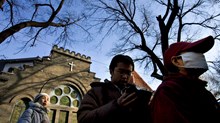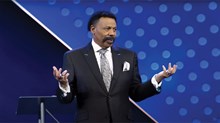The earthquake, tsunami, and meltdown at a nuclear power plant have created an unprecedented disaster in Japan.
While disaster relief efforts proceed, policymakers in the U.S. are examining the wisdom of using nuclear power for electricity. The House of Representatives held hearings this week to examine the state of nuclear plants in the country. The U.S. has about one hundred nuclear facilities, some of which are identical to the plants in Japan.
Energy Secretary Steven Chu said the administration supports expansion of nuclear facilities. The President included $36 billion in his recent budget proposal for support of new reactors and the development of new, smaller reactors.
"We must rely on a diverse set of energy sources, including renewables like wind and solar, natural gas, clean coal and nuclear power,'' said Chu.
Sojourners questions this approach. Jim Rice, editor of Sojourners magazine, said that U.S. energy policy should focus on energy efficiency and renewable energy.
"The ongoing disaster in Japan cries out for our prayers and whatever concrete help we can send," said Rice. "It also stands as a vivid, unmistakable warning of the cost of hubris, one that we ignore at our own peril."
The Two Futures Project (2FP), an evangelical effort to eliminate nuclear weapons, has also weighed in on the question of nuclear power—sort of. 2FP does not have an official position either way because the Nuclear Nonproliferation Treaty allows for peaceful nuclear energy programs. The organization is, however, wary of the threat nuclear power may pose.
"We have consistently said that if nuclear power continues to be used—and especially if it is expanded—a new infrastructure must have built-in technological and diplomatic safeguards to ensure its safe and peaceful use," 2FP director Tyler Wigg-Stevenson said. "Fukushima is a stark reminder, however, that we can never eliminate risk altogether—and that the risks of nuclear technology can be unimaginably high."
Other organizations have supported nuclear power in the past. The Southern Baptist Ethics & Religious Liberty Commission (ERLC) stated in its 2011 legislative agenda, "We support the creation of an 'all-of-the-above' national energy policy that includes responsible use of domestic fossil fuels and much greater reliance on nuclear energy as well as the development of renewable fuel sources." The ERLC has not commented on nuclear power since the earthquake.
World Vision, Baptist Global Response (BGR), Operation Blessing, and other disaster relief organizations are on the ground in Japan, but are having trouble responding to the scope of the crisis.
Pat Melancon, BGR's disaster management specialist, said most disasters have problems that experts can anticipate.
"The Japan event, however, is different," said Melancon. "Here we have three catastrophic events: the earthquake, which did much damage in areas not being featured in the news; the tsunami, which hit the low coastal areas of Japan especially hard; and now an additional unfolding event—the demise of nuclear power plants."
World Vision is also in Japan, where it is focusing its efforts on helping children. It is setting up Child-Friendly Spaces where children can play and work on art and music projects. But, like BGR, it is finding the scope of the task challenging. Hundreds of thousands are displaced, leaving some children to sleep on cardboard pallets with only one blanket to keep them warm, according to World Vision.
World Vision is also addressing the needs of children in the United States who may be fearful because of the Japan events. It prepared a set of tips for parents to help them talk to their own children about the tragedy.
World Vision Japan's Kenjiro Ban said, "This situation is, understandably, very chaotic. I've served on disaster response programs in Kenya, Sudan, India, Pakistan, Myanmar and Haiti and the needs I'm seeing in my own country are as bad as anything I've seen globally."
Copyright © 2011 Christianity Today. Click for reprint information.
Related Elsewhere:
Christianity Today is covering other news related to Japan on LiveBlog.
CT's earlier coverage of disaster relief includes:
Tsunamis and Birth Pangs | Let's not bash traditional Christian answers to disaster, only keep them in context. (January 1, 2005)
Seven Myths of Disaster Relief | What's really needed after a catastrophe. (January 17, 2005)
Temptations in Disaster | A ministry leader in Sri Lanka advises his colleagues on spiritual disciplines during a crisis. (December 1, 2004)
CT Classic: After the Hurricane | Hugo struck my neighbors with terror but not with the fear of God. (July 1, 2004)
Why We Need Earthquakes | Without them, the planet couldn't support creatures like us. (April 28, 2009)

Support Our Work
Subscribe to CT for less than $4.25/month


















